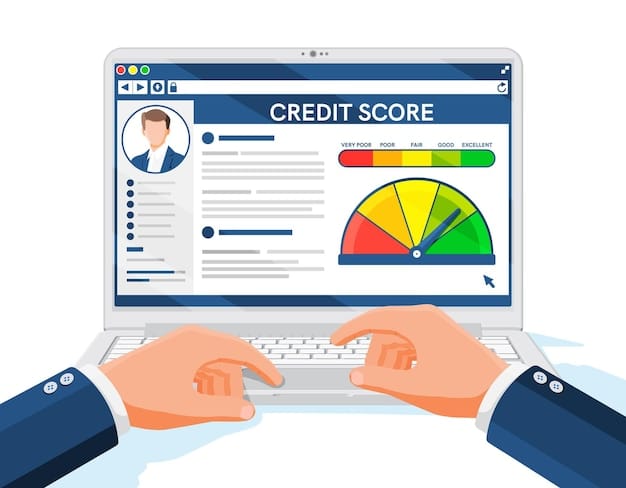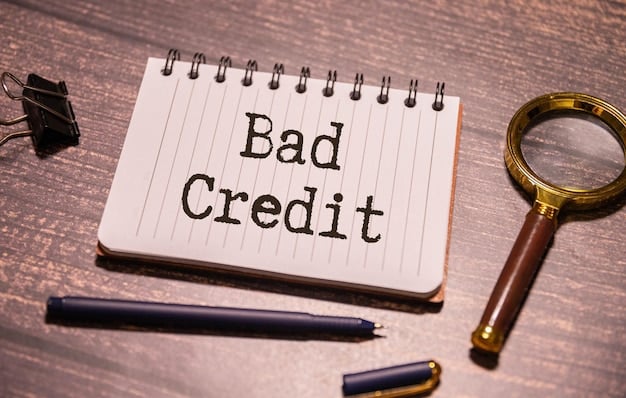Improve Credit Scores: Understanding the Fair Credit Reporting Act Changes

Anúncios
Understanding the latest changes to the Fair Credit Reporting Act (FCRA) empowers consumers to identify and correct inaccuracies in their credit reports, dispute unfair practices, and ultimately implement strategies that can potentially improve their credit scores by an average of 50 points.
Are you looking to boost your credit score? Understanding the nuances of the Fair Credit Reporting Act (FCRA) is crucial. Recent updates to this act can significantly impact your credit health, potentially helping you improve your credit score by an average of 50 points.
Anúncios
What is the Fair Credit Reporting Act (FCRA)?
The Fair Credit Reporting Act (FCRA) is a US federal law designed to protect consumers by promoting accuracy, fairness, and privacy of information in the files of consumer reporting agencies (CRAs). Understanding the basics of FCRA is the first step to ensure that your credit information is accurate and managed responsibly.
Key Provisions of the FCRA
The FCRA establishes several key consumer rights and responsibilities for CRAs. It lays the groundwork for how credit information is collected, used, and protected.
- Right to Access Your Credit Report: Consumers have the right to request and obtain a free copy of their credit report from each of the nationwide CRAs (Equifax, Experian, and TransUnion) once every 12 months.
- Right to Dispute Inaccurate Information: The FCRA allows consumers to dispute inaccuracies or incomplete information on their credit reports. CRAs are required to investigate and correct any verified errors.
- Limits on Reporting Negative Information: The FCRA sets limits on how long negative information can remain on your credit report. Generally, most negative information, such as late payments, can only be reported for seven years, while bankruptcies can be reported for ten years.
How the FCRA Protects Consumers
The FCRA provides significant protections that ensure fair and accurate credit reporting. These protections help consumers maintain control over their credit information and address any potential errors or misuse. By understanding these rights, consumers can take proactive steps to protect their credit health.
Anúncios

Recent Changes to the FCRA: An Overview
The FCRA is not a static law; it evolves to address new challenges and changes in the financial landscape. Several amendments and interpretations have been made over the years to enhance consumer protection and modernize credit reporting.
Evolving Regulations and Interpretations
Recent years have seen several changes in how the FCRA is interpreted and enforced. These changes are often driven by court cases, regulatory guidance from the Consumer Financial Protection Bureau (CFPB), and updates to industry best practices.
- CFPB Guidance: The CFPB plays a crucial role in interpreting and enforcing the FCRA. Its guidance helps CRAs and creditors understand their obligations and ensures consistent application of the law.
- Court Decisions: Court decisions also shape the interpretation of the FCRA. Rulings in cases involving disputes over credit reporting practices can set precedents and clarify the scope of consumer rights.
- Technological Advancements: As technology advances, the FCRA must adapt to address new forms of data collection and use. This includes issues related to online data security, identity theft, and the use of alternative data in credit assessments.
How These Changes Affect Consumers
These changes have significant implications for consumers. They provide new avenues for protecting their credit information and correcting errors. By staying informed about these evolving regulations, consumers can better advocate for their rights under the FCRA.
Understanding these recent changes ensures that consumers are well-equipped to leverage the protections offered by the FCRA.
Disputing Errors on Your Credit Report
One of the most powerful rights granted by the FCRA is the ability to dispute inaccurate information on your credit report. This process allows you to correct errors that could be negatively impacting your credit score.
Steps to File a Dispute
Filing a dispute involves a specific process that must be followed to ensure your dispute is properly investigated. Here are the key steps:
- Obtain Your Credit Report: Request a free copy of your credit report from each of the three major CRAs.
- Identify Errors: Carefully review each report and identify any inaccuracies, such as incorrect account balances, late payments, or identity theft.
- Gather Documentation: Collect any supporting documentation that can help prove the error, such as payment records, account statements, or identification documents.
Crafting an Effective Dispute Letter
The dispute letter is a critical component of the dispute process. A well-written letter can increase the likelihood of a successful resolution.
- Be Clear and Concise: Clearly identify the specific errors you are disputing. Provide detailed information, such as account numbers and dates, to help the CRA locate the information.
- State the Facts: Explain why you believe the information is inaccurate. Provide supporting documentation to substantiate your claim.
- Request Correction: Clearly state that you are requesting the CRA to investigate the error and correct or remove the inaccurate information.
By following these steps and crafting a well-supported dispute letter, you can effectively challenge errors on your credit report and work towards improving your credit score.
Understanding the Impact of FCRA on Credit Scores
The FCRA plays a crucial role in determining your credit score. Understanding how the Act affects this process can empower consumers to take control of their credit profiles and potentially increase their credit scores.
How FCRA Affects Credit Score Calculation
The FCRA impacts credit score calculations by ensuring that the information used to generate scores is accurate, relevant, and up-to-date. This is because credit scoring models, such as FICO and VantageScore, rely on the data reported by CRAs.
When inaccuracies or errors are present in a credit report, they can negatively impact the credit score. For example, if a consumer is incorrectly reported as having a late payment, their credit score may decrease.
Strategies for Improving Credit Score Using FCRA
Here are some strategies on how to potentially improve your credit score:
- Regular Credit Report Review: One of the best ways to leverage the FCRA for credit score improvement is to regularly review your credit reports from all three major credit bureaus. Address any errors or inaccuracies promptly.
- Dispute Inaccuracies: If you find any inaccuracies or errors, promptly file a dispute with the credit bureau. The FCRA mandates that credit bureaus investigate and correct any verified errors within a reasonable timeframe (usually 30 days).
- Monitor Credit Utilization: Keep your credit utilization ratio low. Credit utilization (the amount of credit you’re using compared to your total available credit) is a significant factor in credit scoring models.

The Role of Credit Bureaus and Creditors
Credit bureaus and creditors play significant roles in the credit reporting ecosystem governed by the Fair Credit Reporting Act (FCRA). Understanding their responsibilities and interactions is essential to manage credit information effectively.
Responsibilities of Credit Bureaus
Credit bureaus, also known as consumer reporting agencies (CRAs), are responsible for collecting, maintaining, and providing credit information about consumers. They must comply with FCRA, which sets standards for handling credit data.
Here’s a brief overview of their responsibilities:
- Data Collection: Credit bureaus gather data from various sources, including lenders, credit card companies, and public records.
- Data Maintenance: Credit bureaus are responsible for maintaining accurate and secure credit information.
- Dispute Resolution: Credit bureaus must investigate and resolve disputes filed by consumers regarding inaccuracies in their credit reports.
Responsibilities of Creditors
Creditors, which include banks, credit card companies, and other lenders, also have responsibilities under the FCRA. They provide credit information to credit bureaus and must ensure the information is accurate and reported fairly.
Key creditor responsibilities include:
- Accurate Reporting: Creditors must report accurate and complete information about consumer credit accounts to credit bureaus.
- Investigation of Disputes: Creditors are required to investigate disputes filed by consumers regarding the accuracy of reported information.
- Fair Lending Practices: Creditors must adhere to fair lending practices and avoid discriminatory actions.
Common Misconceptions About the FCRA
Many misconceptions surround the Fair Credit Reporting Act (FCRA), leading to confusion about consumer rights and credit reporting practices. Addressing these misconceptions is crucial for consumers to effectively leverage the protections provided by the FCRA.
Myth: Checking Your Credit Report Will Lower Your Score
One common misconception is that checking your credit report will lower your credit score. This is not true.
Actually, checking your credit report yourself is considered a “soft inquiry,” which does not impact your credit score. Only “hard inquiries,” such as when a lender checks your credit to make a lending decision, can potentially affect your score.
Myth: All Negative Information Must Be Removed After Seven Years
Another common myth is that all negative information must be removed from your credit report after seven years. While most negative information, such as late payments and collections, generally falls off after seven years, there are exceptions.
Myth: Credit Bureaus Are Responsible for Verifying All Information
Some people believe that credit bureaus are responsible for independently verifying all information reported to them. Credit bureaus rely on the information provided by creditors and other data furnishers.
Understanding these misconceptions can empower consumers to take informed actions regarding their credit health and protect their rights under the FCRA.
Now that it’s covered, you have a better understanding on how to potentially improve your credit core and what to do if any incosistencies arise.
| Key Point | Brief Description |
|---|---|
| 📝 Review Reports | Regularly check credit reports for accuracy. |
| ❌ Dispute Errors | File disputes for any inaccuracies found. |
| ⏳ Monitor Updates | Stay informed about FCRA changes. |
| 📊 Score Impact | Understand how FCRA affects credit scores. |
Frequently Asked Questions (FAQ)
▼
The FCRA is a federal law that regulates the collection, dissemination, and use of consumer credit information. Its purpose is to ensure accuracy, fairness, and privacy of this information.
▼
You are entitled to one free credit report from each of the three major credit bureaus (Equifax, Experian, and TransUnion) every 12 months, accessible through AnnualCreditReport.com.
▼
If you find an error, you should file a dispute with the credit bureau that issued the report. Provide details and any supporting documentation to help resolve the issue.
▼
Most negative information, such as late payments and collections, typically remains on your credit report for seven years. Bankruptcies can stay for up to ten years.
▼
While results vary, leveraging the FCRA to correct errors and manage your credit can lead to improvements. A 50-point increase depends on your initial score and the extent of corrections made.
Conclusion
In conclusion, understanding and leveraging the Fair Credit Reporting Act (FCRA) is essential for consumers looking to protect and improve their credit scores. By staying informed and taking proactive steps, you can harness the protections offered by the FCRA and potentially improve your financial well-being.